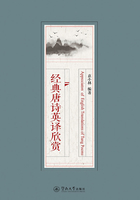
11.滁州西涧
独怜幽草涧边生,上有黄鹂深树鸣。
春潮带雨晚来急,野渡无人舟自横。
中文解读
一般认为《滁州西涧》这首诗是公元781年(唐德宗建中二年)韦应物任滁州刺史时所作。作者任滁州刺史时,时常独步郊外,滁州西涧便是他常光顾的地方。诗人喜爱西涧清幽的景色,有一天游览至滁州西涧,写下了这首诗情浓郁的小诗。诗里写的虽然是平常的景物,但经诗人的点染,却成了一幅意境幽深的有韵之画,还蕴含了诗人一种不在其位,不得其用的无奈与忧伤情怀,也就是诗人对自己怀才不遇的愤愤不平。
首句写静,次句则写动。莺啼婉转,在树丛深处间响起。这不仅仅是写客观景物的时空转移,重要的是写出了诗人随缘自适、怡然自得的开朗和豁达。
接下来“春潮带雨晚来急,野渡无人舟自横”。到傍晚时分,春潮上涨,春雨淅沥,西涧水势顿见湍急。郊野渡口,本来就荒凉冷漠,此刻愈发难觅人踪,只有空舟随波纵横。
“急”与“自”两字互为照应,传达出诗人内心的情感意识,把客观景物和抒情主体有机地融为一体,状出难写之景,达出难言之情。
白话译文
我非常喜爱这河边生长的野草,是那样幽静而有生趣;
河岸上树林的深处,不断传来黄鹂的叫声,婉转动听。
因傍晚下了春雨,河水像潮水一样流得更急了;
在暮色苍茫的荒野渡口,已没有人渡河,只有小船独自横在河边。
英译一
West Creek at Chuzhou
Translated by Burton Watson
These I love, hidden plants that grow by the river's edge;
Above, yellow warblers in the deep trees singing.
Spring tides robed in rain, swifter by evening;
The ferry landing deserted where a boat swings by itself.
(warbler n.黄莺 robe v.穿着袍,裹着 swing v.摇摆)
英译二
On the West Stream at Chuzhou
Translated by Xu Yuanchong
Alone, I like the riverside where green grass grows,
And golden orioles sing amid the leafy trees.
When showers fall at dusk, the river overflows,
A lonely boat athwart the ferry floats at ease.
(amid adv.在……之中athwart adv.横跨)
英译欣赏
The poem deplored the fact that some people were appreciated as they staying idle in lonely places while the imperial court was badly in need of the elites.
这首诗英译颇多,所选英译一是美国著名诗人、翻译家Burton Watson的译文,它代表了西方学者翻译唐诗的风格——对等翻译:These I love, hidden plants that grow by the river's edge; Above, yellow warblers in the deep trees singing。诗句为省略倒装句,原句是:I love these hidden plants that grow by the river's edge; Above, (there are)yellow wrablers singing in the deep trees。我喜欢涧边的幽草,还有上边深深树林里黄鹂的啼鸣。“幽草”翻译成hidden plants。
Spring tides robed in rain, swifter by evening; The ferry landing deserted where a boat swings by itself,晚潮带着春雨流得分外湍急,无人的渡口漂动着一只小舟。此句可以这样理解:Spring tides(that are)robed in rain, (come)swifter by evening; The ferry(is)landing deserted where a boat swings by itself。robed in rain 为过去分词短语作定语,省略了动词come;deserted 为过去分词作伴随状语;where a boat swings by itself乃地点状语从句。此句和Where there is a will, there is a way 是同样句型。
这一译文的特点是用一句英文译全诗。译文中hidden plants、yellow warblers、spring tides 和the ferry landing对译“幽草、黄鹂、春潮、野渡”,比较准确到位。可惜“舟自横”译为swings by itself。
英译二是许渊冲教授的译作,有着“三美”的特点,译诗abab押韵,全诗译文34字,非常简洁精练。
Alone, I like the riverside where green grass grows。Alone, I like,意思是我独自一人在这里,喜欢着。这正是“独怜”之意。而不少人译为I like/love only,我只是喜欢。意义不及原诗。
And golden orioles sing amid the leafy trees。“深树”译为the leafy trees,是一种达意的再创译。
When showers fall at dusk, the river overflows,当黄昏阵雨袭来时,河水漫流。A lonely boat athwart the ferry floats at ease,一只孤独的小船横跨在码头,悠闲地飘在那里。
译文athwart 用得巧妙,许教授的译文既注重整体意境的表达,也注意含义的准确,这里athwart就是例子。译文省略了“上”“深”“春”和“野”这些形容词,但整诗的意境的表达非常到位,代表了中国翻译的深度和广度。
思考
“雨”,这里译为rain 和shower,哪一个更贴近原诗?